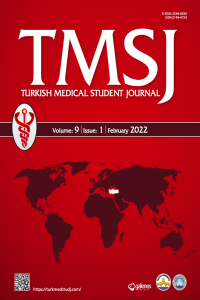OTOSCOPIC EXAMINATION
OTOSCOPIC EXAMINATION
Ear otitis, otoscopes, tympanic membrane,
___
- 1. Austin DF. Diseases of the external ear. In: Ballenger JJ, editor. Diseases of the Nose, Throat, Ear, Head And Neck. Philadelphia: Lea & Febiger; 1991.p.1069-80.
- 2. Selesnick SH. Diseases of the external auditory canal. Otolarygol Clin North Am 1996;8:725-886.
- 3. Asım Aslan. Kulak Anatomisi. In: Can Koç, editor. Kulak Burun Boğaz Hastalıkları ve Baş Boyun Cerrahisi. Ankara: Güneş Kitabevi; 2004.p.45-61.
- 4. External auditory canal. In: Benjamin B, Bingham B, Hawke M, editors. A Colour Atlas of Otorhinolaryngology. London and Philadelphia: Martin Dunitz and JB Lippincott; 1995.p.36-65.
- 5. Akyıldız AN. Kulak hastalıkları ve mikrocerrahisi. Ankara: Bilimsel Tıp Yayınevi;1998.
- 6. Hawke M, Bingham B, Stammberger H et al, editors. Otolaringoloji Tanı El Kitabı. London:Martin Dunitz;2012. 7. Dermatological importance of the ear region. In: Baykal C, Yazganoğlu KD, editors. Dermatological Diseases of the Nose and Ears: an Illustrated Guide. Berlin: Springer; 2016.p.63-117.
- 8. Gaĭvoronskiĭ IV, Iordanishvili AK, Voitiatskaia IV et al. The peculiarities of petrotympanic fissure topography in costen sydrome and possible causes of its development. Morfologia 2014;145(2):58-62.
- 9. Abdelazeem M, Gamea A, Mubarak H et al. Epidemiology, causative agents, and risk factors affecting human otomycosis infections. Turk J Med Sci 2015;45(4):820-6.
- 10. Wright T. Middle-ear pain and trauma during air travel. BMJ Clin Evid 2015.
- 11. Clark GW, Pope SM, Jaboori KA. Diagnosis and treatment of seborrheic dermatitis. Am Fam Physician 2015;91(3):185-90.
- 12. Guss J, Ruckenstein MJ. Infections of the external ear. In: Flint PW, Haughey BH, Lund VJ et al, editors. Cummings Otolaryngology: Head and Neck Surgery. New York: Elsevier/Saunders; 2015.p.1944-62.
- 13. Joy SD. Otoscopic findings accurately diagnose otitis media. American Journal of Nursing 2011;111(6):14–5.
- 14. Kuo CY, Lin YY, Wang CH. Painful rash of the auricle: herpes zoster oticus. Er Nose Throat 2014;93(12):47.
- 15. Maqbool M. Textbook of Ear, Nose and Throat Diseases. 11th edition. New Delhi: J.P.Medical; 2013.
- 16. DiMuzio JJ, Deschler DG. Emergency department management of foreign bodies of the external ear canal in children. Otol Neurotol 2002;23:473–5.
- 17. Monasta L, Ronfani L, Marchetti F et al. Burden of disease caused by otitis media: systematic review and global estimates. PLoS ONE 2012;7(4):e36226.
- 18. Qureishi A, Lee Y, Belfield K et al. Update on otitis media – prevention and treatment. Infect Drug Resist 2014;7:15-24.
- 19. Koçyiğit M, Uzun C. Comparison of the diagnostic accuracies of four main otoscopic examination methods. International Journal of Surgery and Medicine 2017;3(2):78-84.
- ISSN: 2148-4724
- Başlangıç: 2014
- Yayıncı: Trakya Üniversitesi
Varahabhatla Vamsi, Maganty Virajitha, Lihasenko Ivetta
THE EVALUATION OF MUSCULOSKELETAL SYSTEM TUMORS AND TUMOR LIKE LESIONS IN THRACE REGION
Ece ŞENYİĞİT, Begüm SÖYLEYİCİ, Nur Gülce İŞKAN, Hilal Sena ÇİFCİBAŞI, Aslı GÖZTEPE, Mert ÇİFTDEMİR
A CASE REPORT: A MOTHER WITH SECONDARY INFERTILITY
Aslı GÖZTEPE, Mahmut Alper GÜLDAĞ, Koray ELTER
THE EFFECT OF PREVENTION FOR PEER BULLYING IN SECONDARY SCHOOL
Batuhan Mutlu, Şermin Yalın Sapmaz, Beyhan Cengiz ÖZYURT, İrem ŞENEL, Elif METİN, Melisa SARGUT, Riyadh SAEED, Bengisu UZEL TANRIVERDİ, Hasan KANDEMİR, Cevval ULMAN
RESEARCH OF URGENT BIOCHEMISTRY TEST ORDERING HABIT
Kubilay ELMACI, Betül İNCE, Sevgi ESKİOCAK, Eray ÖZGÜN
Berkay KEF, Nur Gülce İŞKAN, Kemal KEF
THE INVESTIGATION OF UNIVERSITY STUDENTS’ KNOWLEDGE ON NUTRITION AND EATING HABITS
Ertuğrul KOÇAK, Atakan Muhammet PARLAK, Orkun Salih KIZILKAYA, Burak BARDAKÇI, Musa Eralp KILIÇ, Sevgi ESKİOCAK
